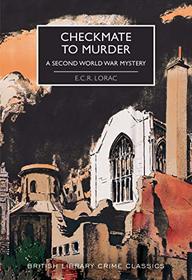A respectable little puzzle, but what really made this for me was the way it immerses the reader in the realities of wartime London-- for good and ill.
A number of mysteries by Caroline Rivett (ECR Lorac) were written, and set, in Britain of 1939-1945. I deliberately make the distinction "written and set," as I feel that it's an important element of the tone of the novels-- neither Rivett nor her characters know how "all this" is going to end. Will their sacrifices and deprivations turn out to be worth it, and will Britain and its Allies triumph? Or ...?
The mystery is good: it's a neat little puzzle, solved by Inspector McDonald and his team with dogged footwork, good psychology, and some dark police humour. But what really captured me was the conditions in which they all -- the good, the bad, and the murderous -- were living. The obsession with black-out. The shortage of staple foodstuffs, to the point that a cup of China tea (albeit without sugar) is considered a great luxury. The knowledge that death could descend from a clear moonlit sky at any time.
Like a B-team Jane Austen, Lorac keeps her eyes fixed firmly on the small stuff -- the domestic details, the personal relationships, the misdemeanors (a pub landlady who is pestered by her customers to slip them a bottle of whiskey, contrary to rationing. The people who think black-out regulations don't apply to them.) while terrible crimes are being perpetuated just over their horizon. If you have any romantic notions that all Londoners were saintly patriots, in the "Keep Calm and Carry On" mold, a novel like this will put you straight.
Having said that, there are some wonderful examples of ordinary, everyday heroism. Like the pub landlady, who describes a Luftwaffe air raid as "Not what I'd call a real raid, not enough to make me get up and put the kettle on ..."
I'd call this Lorac, at her best ...
A number of mysteries by Caroline Rivett (ECR Lorac) were written, and set, in Britain of 1939-1945. I deliberately make the distinction "written and set," as I feel that it's an important element of the tone of the novels-- neither Rivett nor her characters know how "all this" is going to end. Will their sacrifices and deprivations turn out to be worth it, and will Britain and its Allies triumph? Or ...?
The mystery is good: it's a neat little puzzle, solved by Inspector McDonald and his team with dogged footwork, good psychology, and some dark police humour. But what really captured me was the conditions in which they all -- the good, the bad, and the murderous -- were living. The obsession with black-out. The shortage of staple foodstuffs, to the point that a cup of China tea (albeit without sugar) is considered a great luxury. The knowledge that death could descend from a clear moonlit sky at any time.
Like a B-team Jane Austen, Lorac keeps her eyes fixed firmly on the small stuff -- the domestic details, the personal relationships, the misdemeanors (a pub landlady who is pestered by her customers to slip them a bottle of whiskey, contrary to rationing. The people who think black-out regulations don't apply to them.) while terrible crimes are being perpetuated just over their horizon. If you have any romantic notions that all Londoners were saintly patriots, in the "Keep Calm and Carry On" mold, a novel like this will put you straight.
Having said that, there are some wonderful examples of ordinary, everyday heroism. Like the pub landlady, who describes a Luftwaffe air raid as "Not what I'd call a real raid, not enough to make me get up and put the kettle on ..."
I'd call this Lorac, at her best ...




